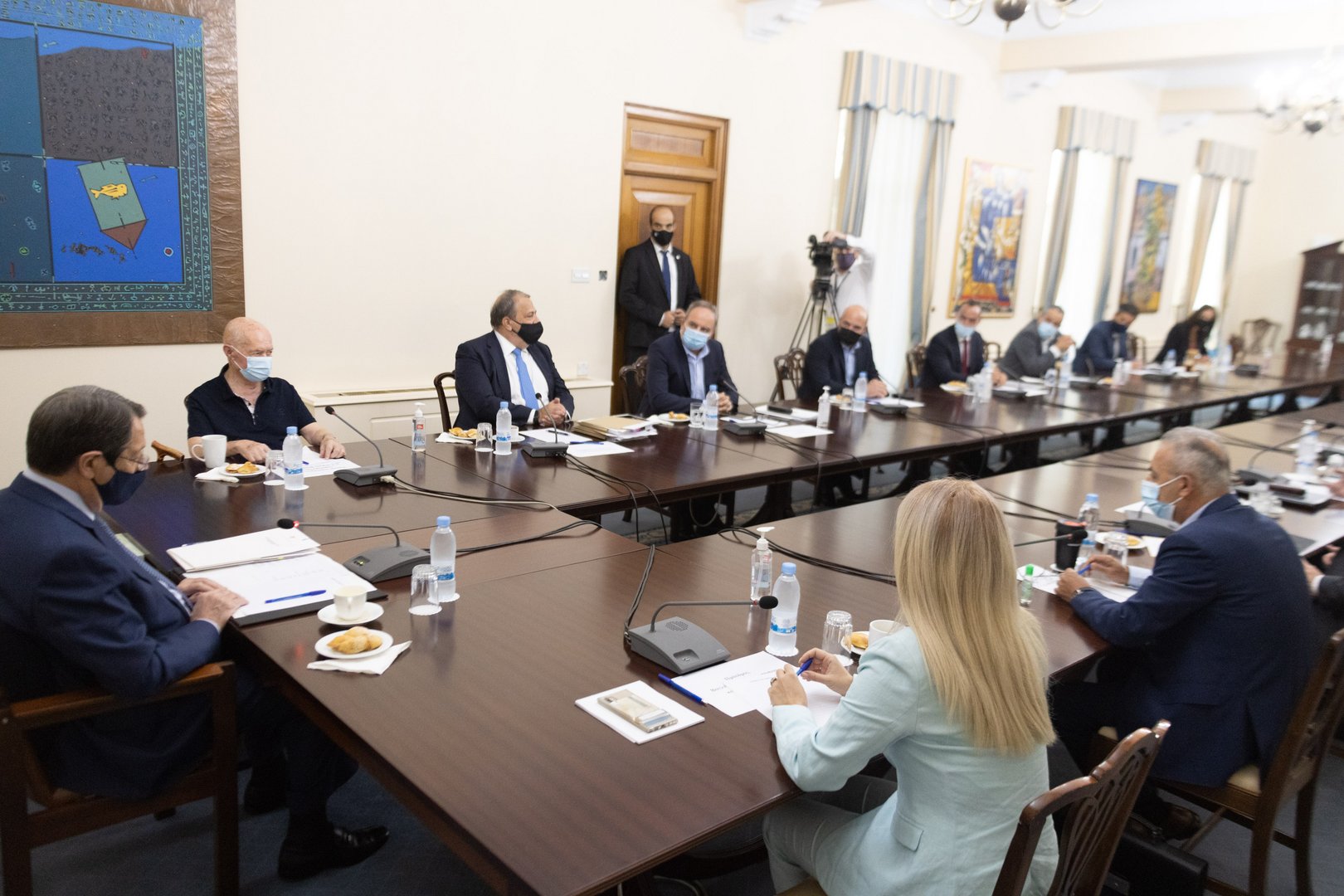Main opposition Akel lambasted the government on Wednesday for its policy on the Cyprus problem as President Nicos Anastasiades outlined his proposal over a possible restoration of the 1960 constitution to members of the National Council.
Tensions reportedly rose at the National Council meeting when Akel leader Stephanos Stephanou harshly criticised Anastasiades and the way he has handled the Cyprus problem since when he was first elected as president.
“Despite the disagreements expressed, the discussion took place at a perfectly politically acceptable level, as dictated by democratic rules and political culture,” Government Spokesman Marios Pelekanos said after the meeting.
Stephanou too said there were disagreements, but the room did not turn “into a battlefield.”
The National Council, presided by Anastasiades, convened in the morning to discuss the latest developments on the Cyprus problem, ahead of the president’s trip to New York later this month where he will attend the UN General Assembly and have a meeting with the Secretary-General Antonio Guterres.
According to Pelekanos he also analysed “the reasons and the content of the proposal that he briefly outlined on August 25, in response to Mr Tatar’s allegations about the Greek Cypriot state and the disregard of the rights of the Turkish Cypriots as they arise from the establishment agreements of the Republic of Cyprus (RoC).”
Stephanou said after the meeting he expressed his party’s disagreement with the policy pursued on the Cyprus issue, which “is characterised by contradictions and conflicting approaches and policies.”
Referring to Foreign Minister Nikos Christodoulides’ statements earlier this week that this reference by Anastasiades was a figure of speech to counter Turkish Cypriot leader Ersin Tatar’s dismissive stand against the RoC and not an actual proposal, Stephanou said when asked at the meeting, the president said it was a proposal.
“The president’s proposal to return to the 1960 constitution diverts us from the resolutions and cancels the high-level agreements,” Stephanou said.
Pelekanos said the proposal is part of the initiatives undertaken by Anastasiades aimed at resuming a dialogue that would avert the Turkish Cypriot side to submit partitionist proposals contrary to the Treaty of Establishment of the RoC and the February 2014 Joint Declaration, “which clearly prohibit the secession of part or all of the territory or the union of part or all of the territory with any state.”
He added that Anastasiades, on the basis of his response/proposal to Tatar, stressed to the National Council members that it is directly linked with the high-level agreements, the UN resolutions and the EU acquis, with a view to finding a functional and therefore viable solution, averting Turkish plans.
But Diko leader Nicolas Papadopoulos said after the meeting that “the issue was over” to them since there will be no follow-up on the basis of this suggestion.
“The infamous statement on the restoration of the 1960 constitution was an attempt by the president to highlight the irrational positions of Mr Tatar,” Papadopoulos said. He did call on Anastasiades, however, refrain from “such ambiguous positions because they tend to steer attention away from important issues and give the opportunity to those who want to change the basis of the negotiations to invoke statements by the President of the Republic.” The Diko leader called for escalation of the measures taken by the RoC to have a stronger impact on Turkey.
Disy leader Averof Neophytou, who has been keeping his statements to the minimum after the past few National Council meetings, said the goal was to continue efforts for a way to restart the negotiations for the settlement of the Cyprus problem within the UN framework and the agreed solution basis.
Edek leader Marinos Sizopoulos referred, among other things, to guarantor Britain’s “suspiciously undermining role at the expense of the RoC through various interventions.” He said Britain has been trying, during meetings with the two sides, to gradually introduce the notion of ‘sovereign equality’.
“There are various methods which we believe will lead to potentially crucial developments which will undermine the state entity of the RoC,” Sizopoulos said.
Anastasiades, in a written statement last week responding to criticism by Tatar on the government’s decision to revoke the RoC passports of 14 Turkish Cypriots, among them Tatar, said the Greek Cypriot community was “fully prepared to accept restoration of constitutional order with the return of the Turkish Cypriots to the executive, the legislature, the judiciary, and the rest of the services, based on the provisions of the 1960 constitution, with the simultaneous start of talks to define the areas which each community will be responsible to administer based on UN resolutions.”
This provoked strong reactions on both sides of the divide with Akel outright rejecting Anastasiades’ proposal. The party also accused the president of adopting the positions of the most extreme political forces that call for a unitary state and not a federal solution.







Click here to change your cookie preferences